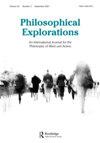How to overcome self-illness ambiguity in addiction: making sense of one’s addiction rather than just rejecting it. A reply to McConnell and Golova
IF 1.1
3区 哲学
0 PHILOSOPHY
引用次数: 0
Abstract
ABSTRACT McConnell and Golova [2022. “Narrative, Addiction, and Three Aspects of Self-Ambiguity.” Philosophical Explorations. doi:10.1080/13869795.2022.2115532] argue that people with addiction often struggle to recover because there is a conflict between their self-narrative of ‘hopeless addict’ and their evaluative judgment that they value recovery. They add ‘narrative ambiguity’ as a third source of self-ambiguity, next to essential characteristics/embodiment and values/judgments. I argue that McConnell and Golova [2022. “Narrative, Addiction, and Three Aspects of Self-Ambiguity.” Philosophical Explorations. doi:10.1080/13869795.2022.2115532] pay insufficient attention to how a self-narrative of ‘hopeless addict’ is formed. This hopeless script is not a given narrative, but emerges due to conflicts in the other two sources of self-ambiguity: long-term addiction changes embodiment, and results in the experience that people fail to let their behaviour be guided by their values. Hence, they label themselves hopeless and not able to recover. In that sense, narrative ambiguity is not simply a third source of self-ambiguity, but is both a standalone source, as an organizing principle that tries to make sense of conflicts in the other sources of self-ambiguity. To overcome this narrative ambiguity, it is important to make sense of one’s addiction, rather than experiencing it as simply alienating. I give some examples of how people manage to do this: to incorporate their years of addiction into their life story without identifying with it in a hopeless manner.如何克服成瘾中的自我疾病模糊:理解一个人的成瘾,而不是仅仅拒绝它。这是对麦康奈尔和戈洛娃的回复
McConnell和Golova[2022]。“叙事、成瘾和自我模糊的三个方面”哲学的探索。[Doi:10.1080/13869795.2022.2115532]认为,成瘾者往往难以康复,因为他们自我叙述的“无望的成瘾者”与他们重视康复的评估判断之间存在冲突。他们将“叙事歧义”作为自我歧义的第三个来源,仅次于基本特征/体现和价值观/判断。我认为McConnell和Golova[2022。“叙事、成瘾和自我模糊的三个方面”哲学的探索。[Doi:10.1080/13869795.2022.2115532]对“无望的瘾君子”的自我叙述是如何形成的关注不够。这个无望的剧本不是一个给定的叙述,而是由于其他两个自我模糊来源的冲突而出现的:长期成瘾改变了体现,并导致人们无法让自己的行为受到价值观的指导。因此,他们给自己贴上无望、无法康复的标签。从这个意义上说,叙事歧义不仅仅是自我歧义的第三个来源,而且是一个独立的来源,作为一种组织原则,它试图理解其他自我歧义来源中的冲突。为了克服这种叙事的模糊性,重要的是要理解一个人的成瘾,而不是简单地将其视为疏远。我举了一些例子来说明人们是如何做到这一点的:把他们多年的成瘾融入到他们的生活故事中,而不是以一种绝望的方式认同它。
本文章由计算机程序翻译,如有差异,请以英文原文为准。
求助全文
约1分钟内获得全文
求助全文

 求助内容:
求助内容: 应助结果提醒方式:
应助结果提醒方式:


